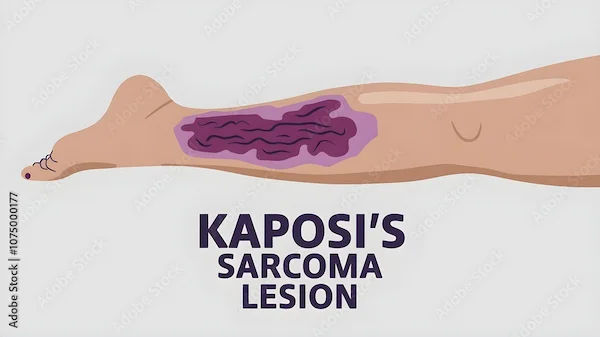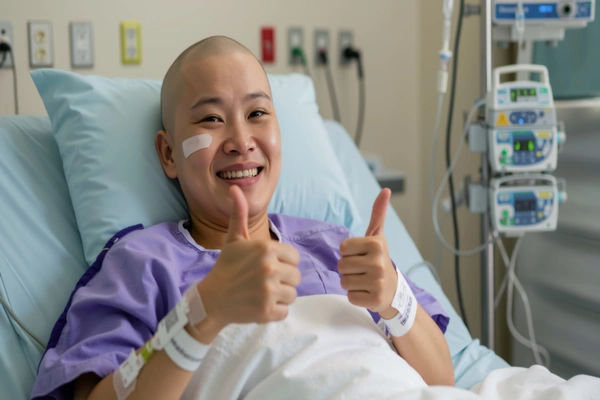Symptoms, Causes, Treatment, and Types of Squamous Cell Carcinoma
Know about the squamous cell carcinoma, types, causes, symptoms, management and treatment options and more.

Written by Dr. D Bhanu Prakash
Reviewed by Dr. Shaik Abdul Kalam MD (Physician)
Last updated on 13th Jan, 2026

Introduction
Squamous cell carcinoma (SCC) is a common type of skin cancer that develops in the squamous cells, which are flat, thin cells found in the outer layer of the skin. While it is usually not life-threatening when detected early, untreated SCC can grow deeper into the skin and spread to other parts of the body, leading to serious complications.
This article will help you understand the symptoms, causes, treatment options, and types of squamous cell carcinoma in simple terms.
Symptoms of Squamous Cell Carcinoma
Squamous cell carcinoma often appears on sun-exposed areas like the face, ears, neck, hands, and arms, but it can develop anywhere on the body. Here are some common signs to watch for:
- A firm, red bump – Often looks like a wart or a sore that doesn’t heal.
- A flat, scaly patch – May resemble a rough, crusty spot on the skin.
- A sore that bleeds or scabs repeatedly – Doesn’t heal properly and keeps coming back.
- A raised growth with a central depression – Sometimes looks like an open sore with raised edges.
- A wart-like growth – May have a rough surface and can be tender to touch.
If you notice any of these changes on your skin, especially if they persist for more than a few weeks, it’s important to consult a doctor.
Consult an Oncologist for Personalised Advice
Causes and Risk Factors of Squamous Cell Carcinoma
SCC occurs when DNA damage in squamous cells leads to uncontrolled growth. The main causes and risk factors include:
1. Sun Exposure
- Prolonged exposure to ultraviolet (UV) rays from the sun or tanning beds is the leading cause.
- People with fair skin, light hair, and blue or green eyes are at higher risk.
2. Weakened Immune System
- Conditions like HIV/AIDS, organ transplants, or long-term immunosuppressive medications increase the risk.
3. Age and Gender
- Older adults (especially over 50) are more likely to develop SCC.
- Men are more prone to SCC than women.
4. Previous Skin Conditions
- Chronic wounds, burns, or scars can develop into SCC over time.
- Conditions like actinic keratosis (precancerous skin patches) can progress to SCC.
5. Chemical Exposure
- Long-term exposure to arsenic, tar, or industrial chemicals may increase risk.
Types of Squamous Cell Carcinoma
There are different types of SCC, classified based on their appearance and behaviour:
1. Cutaneous Squamous Cell Carcinoma (cSCC) – The most common type, affecting the skin.
2. Oral Squamous Cell Carcinoma – Develops in the mouth, often linked to tobacco or alcohol use.
3. Oesophageal SCC – Affects the food pipe, often due to smoking or acid reflux.
4. Lung SCC – A type of lung cancer linked to smoking.
5. Metastatic SCC – When cancer spreads to lymph nodes or other organs.
Most cases of SCC are localised (limited to the skin), but early detection is crucial to prevent complications.
Treatment Options for Squamous Cell Carcinoma
The treatment depends on the size, location, and stage of the cancer. Common options include:
1. Surgical Removal
- Excision – The tumour is cut out along with some healthy skin around it.
- Mohs Surgery – A precise method where thin layers of skin are removed and examined until no cancer cells remain (best for sensitive areas like the face).
2. Radiation Therapy
- Used when surgery isn’t an option (e.g., for elderly patients or tumours in difficult locations).
3. Cryotherapy
- Freezing the tumour with liquid nitrogen (effective for small, early-stage SCC).
4. Topical Treatments
- Medicated creams (like 5-fluorouracil or imiquimod) for superficial SCC.
5. Immunotherapy & Targeted Therapy
- Used for advanced SCC that has spread, helping the immune system fight cancer.
Your doctor will recommend the best treatment based on your specific case.
Prevention and Self-Care Tips
While not all cases of SCC can be prevented, you can reduce your risk by:
- Protecting your skin from the sun – Wear broad-spectrum sunscreen (SPF 30+) daily, even on cloudy days.
- Avoiding tanning beds – They emit harmful UV rays that increase cancer risk.
- Wearing protective clothing – Hats, long sleeves, and sunglasses help shield your skin.
- Checking your skin regularly – Look for new or changing moles, sores, or growths.
- Quitting smoking – Reduces the risk of oral and lung SCC.
If you have a history of skin cancer or precancerous lesions, regular dermatologist check-ups are essential.
When to See a Doctor?
If you notice any unusual skin changes, especially:
- A sore that doesn’t heal within a few weeks.
- A growing, bleeding, or painful bump.
- A scaly patch that gets thicker over time.
Early detection greatly improves treatment success, so don’t delay getting checked.
Final Thoughts
Squamous cell carcinoma affects the squamous cell layer. It is identified as raised wart like growth of cell with central depression which is caused due to sun exposure, weak immune system and is influenced by age and gender. The treatmen in this case is done through radiation therapy, chemotherapy and medications. Consult your doctor in case of any query and for further advice.
Consult an Oncologist for Personalised Advice
Consult an Oncologist for Personalised Advice

Dr. Harsh J Shah
Surgical Oncologist
15 Years • MS, MCh (GI), DrNB (GI)
Ahmedabad
Apollo Hospitals Gandhinagar, Ahmedabad

Dr. Nikhil Agrawal
Surgical Oncologist
18 Years • MBBS, MS, MCh (AIIMS, New Delhi)
Delhi
Apollo Hospitals Indraprastha, Delhi

Dr. V R N Vijay Kumar
Surgical Oncologist
9 Years • MBBS, MS (Gen. Surg.), DNB (Surg. Onco.)
Ahmedabad
Apollo Hospitals Gandhinagar, Ahmedabad

Dr. Mano Bhadauria
Radiation Specialist Oncologist
25 Years • MBBS, MD
Delhi
Apollo Hospitals Indraprastha, Delhi

Dr Harshit Srivastava
Oncologist
7 Years • MS (General Surgery) , MCh (Surgical Oncology)
Lucknow
Apollomedics Super Speciality Hospital, Lucknow
Consult an Oncologist for Personalised Advice

Dr. Harsh J Shah
Surgical Oncologist
15 Years • MS, MCh (GI), DrNB (GI)
Ahmedabad
Apollo Hospitals Gandhinagar, Ahmedabad

Dr. Nikhil Agrawal
Surgical Oncologist
18 Years • MBBS, MS, MCh (AIIMS, New Delhi)
Delhi
Apollo Hospitals Indraprastha, Delhi

Dr. V R N Vijay Kumar
Surgical Oncologist
9 Years • MBBS, MS (Gen. Surg.), DNB (Surg. Onco.)
Ahmedabad
Apollo Hospitals Gandhinagar, Ahmedabad

Dr. Mano Bhadauria
Radiation Specialist Oncologist
25 Years • MBBS, MD
Delhi
Apollo Hospitals Indraprastha, Delhi

Dr Harshit Srivastava
Oncologist
7 Years • MS (General Surgery) , MCh (Surgical Oncology)
Lucknow
Apollomedics Super Speciality Hospital, Lucknow




